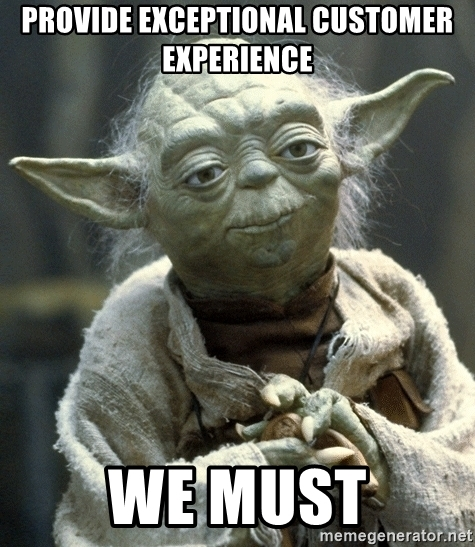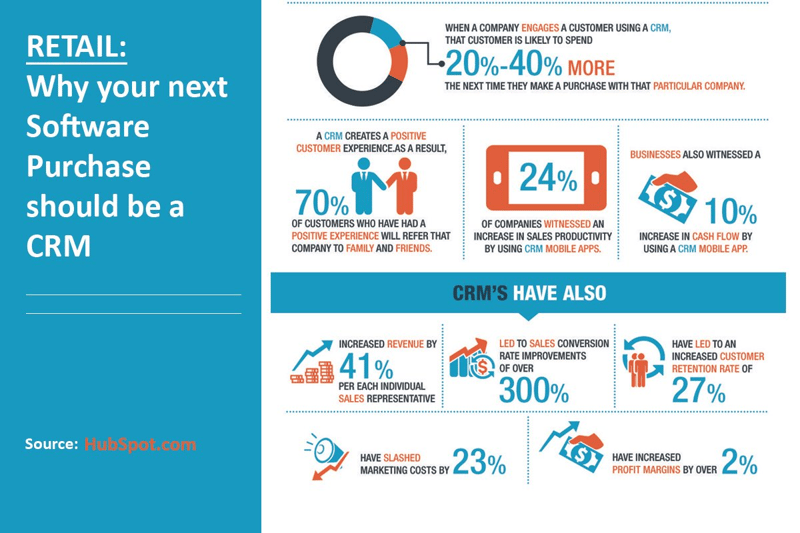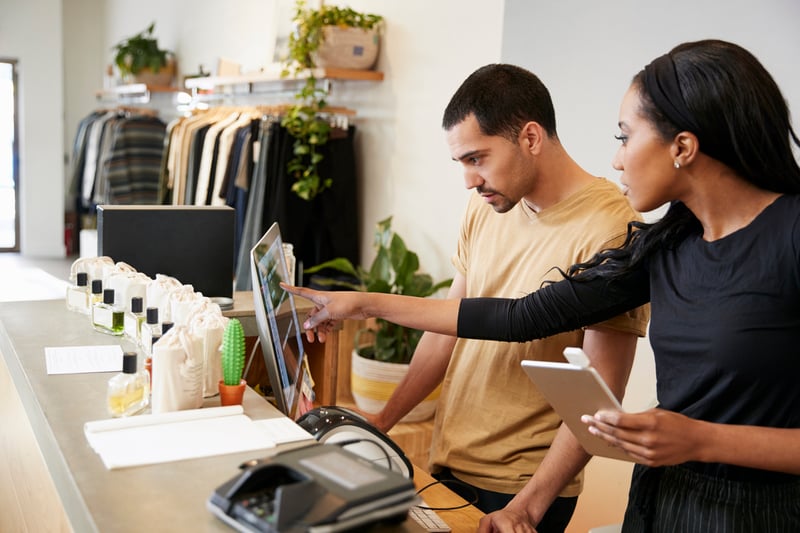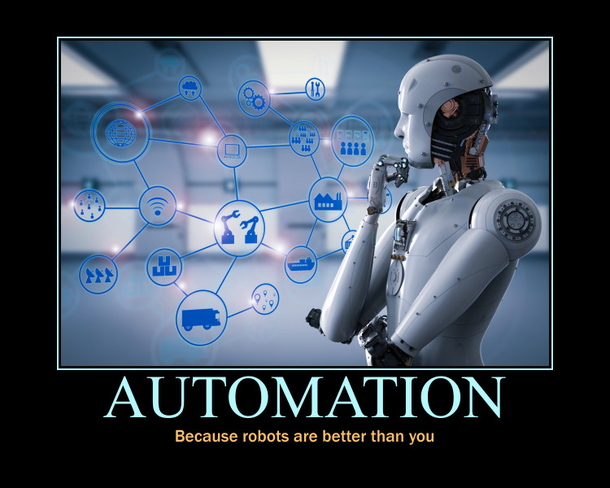
5 Retail CRM Strategies Your Team Will Thank You For
 Updated on
Updated on
 By Katie Bowman
By Katie Bowman
Katie Bowman
Katie has extensive experience in customer service and enjoys the opportunity to help others. She is committed to providing high-quality service and d...
learn more
Katie Bowman
Katie has extensive experience in customer service and enjoys the opportunity to help others. She is committed to providing high-quality service and d...
Table of Contents
Table of Contents
Providing an excellent customer experience (CX) is a big thing. Especially in the retail sector.
Or is it?
Let's check in with someone that has almost 900 years of experience:

You heard it here first: Yoda backs CX as a big thing.
That should be more than enough to convince you, but we'll give you two more compelling facts anyway (in case you're a fan of the dark side and don't trust this darned rebel):
- 83% of customers feel more loyal to brands that respond to and resolve their complaints.
- 39% of CEOs believe improving customer experience is key to a lasting competitive advantage.
Alright, so we agree. CX = big thing.
But what does that have to do with retail CRMs?
Everything and more.
A retail CRM is a technology that underpins all of your clients' experiences with your organization, from the first time they lay eyes on your website to their 100th purchase.
You simply can't deliver cutting-edge CX without a cutting-edge retail CRM (and knowing how to unleash its force).
And that's why we'll teach you everything you need to know about retail CRMs, including:
- What a retail CRM is
- Its seven major benefits
- Four proven CRM strategies
- A few case studies
- The criteria for choosing a retail CRM and the five best platforms
- FAQs
It's a lot to get through in one post, so let's dive right in!
What Is a Retail CRM?
A retail CRM is a CRM system that's been customized to meet the needs of the retail industry.
Slow down there, mister; what's a CRM system?
Easy: a CRM (short for Customer Relationship Management) is a software solution that enables companies to collect, store, organize, access, and analyze their customer data.
It also works wonders for managing prospects, optimizing marketing efforts, and staying on top of the sales pipeline.
The main goal of a CRM system is to empower companies to build better relationships with their customers (current, past, and future) - hence its name.
And it isn't hard to imagine the effects of better relationships → better business performance.
Now that we're all on the same page, we can get back to retail CRMs.
What Makes a Retail CRM Unique?
Because developers created CRMs primarily as B2B enterprise technology, most CRM software is geared toward companies with long sales cycles and complex deal pipelines.
But that doesn't work when you're a retailer, no matter whether you're selling in brick-and-mortar stores or online in a snazzy webshop.
Luckily, software developers noticed that retailers were struggling to customize CRMs and took action.
They optimized CRM for retail industry clients to support a completely different business model, where the norm is high frequency, repeat purchases without long deliberation periods.
These modern programs can now:
- Provide retail-specific insights, including average order value and lifetime spend
- Segment customers
- Inform and optimize loyalty programs
- Support multi-channel or omnichannel retailing
- Empower in-store staff with timely customer data
- Analyze sales trends and consumer behavior
- Integrate with:
- Enterprise resource planning systems (ERP)
- Inventory management systems (IMS)
- Point of sale systems (POS)
Sound like the kind of thing you need?
Awesome. Keep reading and dive deeper into this powerful symbiosis.
Retail and CRM: The Ultimate Team
If we said that retail CRMs and retailers went together like peanut butter and jelly, we wouldn't be exaggerating in the slightest.
Just think that retailers have emerged as the largest end-users of CRM software at 23.5% of the total market, beating out other industries more usually associated with this technology.
Why?
Cut-throat competition and online sales growth have driven the entire industry to demand technology that allows retailers to become more customer-centric and offer a seamless experience across channels.
And that's what retail CRM systems do best.
Here's a quick infographic from the wonderful folks over at HubSpot to prove this point:

Need a bit more information about the benefits of implementing a retail CRM?
Don't even think about doing another Google search; we've got you covered right here with the seven benefits of CRM retail software.
P.S. If you were satisfied with the infographic and want to save a bit of time, don't be shy to skip ahead to the four retail CRM strategies we promised you in the title.
The Seven Key Benefits of CRM in the Retail Sector

1. Better Customer Service
Did you know that a massive 65% of consumers have stopped patronizing a brand over a single bad customer service experience?
Yikes.
That means you need to step your game up if you intend to retain your customers and prevent them from jumping ship to the competition.
Retail CRM software helps retailers better equip their employees to handle tough situations. With a retail CRM, your customer service staff has all the information they need to answer questions, resolve problems (reactively and proactively), and go above and beyond for clients.
Your customers will finally feel like they're speaking to a real person, and they'll happily say goodbye to poor service, irrelevant communication, and frustrating experiences.
The stats back us up here:
47% of business users confirm that their CRM had a significant impact on customer satisfaction rates.
2. More Personalization
Everyone has their particular likes, needs, and lifestyles, and our shopping habits and preferences reflect these differences.
Let's give you an example:
Extroverted Jane loves going to the mall every Saturday, while introverted John hasn't been since the late 90s when online retailing took off.
Can you target both Jane and John and transform them into loyal customers?
You can IF you have a retail CRM.
A CRM platform gives you all the shopping data you need to segment your customers and personalize marketing campaigns and communications.
This approach ensures John only receives online vouchers for products he cares about, while Jane is pampered and rewarded for dropping by your store every Saturday.
3. Improved Customer Experience
Time for another jaw-dropping statistic about CX:
Did you know that a whopping 86% of buyers are actually willing to pay more just to get a fantastic customer experience? It's true! So, if you want to win over your customers and keep them coming back for more, focusing on delivering a top-notch customer experience is the way to go.
If you ignore the customer experience, you will essentially cut your potential audience down to the 27% of consumers who aren't bothered about CX.
Not a smart move when you're in one of the most competitive industries around.
CRMs, on the other hand, make it nearly impossible to neglect CX because these platforms bring customer information and insights to the forefront of your mind.
How can you possibly stand idly by when you know that 95% of your customers make one measly purchase and then never return?
You won't, and that's the beauty of retail CRMs.
4. Data Collection, Storage, and Access Made Easy
If you're old or unlucky enough to remember what it was like to manage customer data in Excel or a legacy system, then using a CRM to store data is like finding the Holy Grail.
A CRM all but guarantees that you won't have to fidget around with customer data, spreadsheets, invoices, surveys, or whatever else the CEO demands. Ever again.
Hallelujah!
And on top of that, since a CRM is a machine, it's not prone to making errors or forgetting a couple of critical details because it hit the town too hard last night.
In summary: you won't break a sweat to enter the data or organize it, and you'll never lose your cool again because what you're looking for has mysteriously gone missing.
5. Reduced Operating Costs
"Reduced operating costs" is usually not the first expression to come to mind when people think about customer relationship management software.
After all, implementing a CRM brings added costs to your P&L statement.
However, take a closer look. You'll uncover the significant cost savings of using a CRM as the technological backbone for delivering a superior customer experience.
Deloitte estimates that implementing a CRM can lead to a 33% reduction in the cost of serving customers.
Cha-ching.
6. More Repeat Purchases
Customer loyalty is one of the major factors driving costs down as you improve CX.
It's a simple chain reaction:
Superior CX → Happy customers → Loyal customers → 5x more likely to buy again and 4x more likely to refer friends → More sales without having to spend a fortune on marketing.
And it gets even better:
With a retail CRM, you know precisely who your loyal customers are, so you can send them an impossible-to-overlook offer at the perfect moment.
This message shows them you care and results in even more sales.
What could be better?
Only one thing:
7. Great ROI & Higher Revenues
Standing up in front of your C-suite and telling them your company's retail CRM solution has produced an ROI of as much as 871%.
With numbers like those, you're sure to gain the respect and admiration you deserve (especially amongst the finance folks that'll be approving your future investments).
But it isn't merely your ROI that will skyrocket; it's also your organization's revenue.
Just consider that retailers that provide first-class personalized CX bring home more revenue than competitors who struggle in this crucial area.
This number helps explain Amazon's incredible success and demonstrates that no retailer (online or not) can afford to fall behind.
Five Proven CRM Strategies in Retail

Knowing your shoppers inside and out, anticipating their needs, and crafting experiences that make them shout your praises from the rooftops – that's the secret sauce to building a loyal customer base that keeps coming back for more. And guess what? That's where a retail CRM system steps in.
But a powerful tool deserves a smart playbook, and when it comes to retail CRM strategies, there are some surefire tactics that guarantee your customers fall head over heels for your brand.
Let's spill the beans!
Set Clear Goals and KPIs
It's like the saying goes, "If you aim for nothing, you'll hit it every time." Don't let that be your retail reality! Before diving into the CRM ocean, define your goals – do you want to boost sales by 15%? Increase customer retention by 20%? Whatever it is, make it SMART (Specific, Measurable, Achievable, Relevant, and Time-bound) and use your retail CRM software as your personal roadmap to success.
Track key metrics like conversion rates, average order value, and customer churn rate so you can see what's working and what needs a makeover. Remember, a good CRM is like a crystal ball, giving you insights to fine-tune your strategies and hit those goals bullseye!
Implement Automated Workflows
Picture this: a customer makes a purchase, and boom! They receive a personalized thank-you email with a special discount on their next buy. That's the magic of automated workflows – taking repetitive tasks off your plate while keeping your customers engaged. Use your retail CRM to set up automated birthday greetings, abandoned cart reminders, or even product recommendations based on past purchases.
These little touches show your customers you care, boosting loyalty and keeping them coming back for more. And hey, the best part? You can focus on building stronger relationships while the CRM works its magic behind the scenes – like a tireless customer service elf with a gift of automation!
Create Personalized Customer Experiences
In today's age of mass-produced everything, personalization is the antidote to boredom. Your retail CRM holds the key to unlocking a treasure trove of customer data – purchase history, preferences, you name it!
Use this information to craft personalized experiences that make your customers feel like valued VIPs. Imagine sending targeted promotions based on their interests, or offering birthday discounts on their favorite products. These tailored gestures scream "We know you, and we appreciate you!" It's like sending a virtual handshake that says, "Welcome to the club, fellow brand enthusiast!"
Leverage CRM Data to Strengthen Customer Loyalty and Retention
Loyalty programs aren't just about point-collecting anymore; they're about building emotional connections. Use your retail CRM data to identify your most loyal customers and shower them with exclusive perks and rewards.
Early access to sales, personalized recommendations, or even invitations to exclusive events – these VIP experiences make them feel like part of the family, not just another customer number. Remember, happy customers are repeat customers, so treat your loyal bunch like royalty and watch your retention rates soar!
Utilize Drip Marketing to Keep Customers Engaged
Think of drip marketing like sending your customers love letters in the form of emails, texts, or social media messages. But instead of cheesy sonnets, these messages offer helpful tips, relevant product updates, or sneak peeks at upcoming discounts. It's a gentle nudge to keep your brand top-of-mind without being pushy.
Use your retail CRM to segment your audience and tailor your drip campaigns to their specific interests. Imagine sending cooking enthusiasts recipes using your products, or fashionistas sneak peeks at new arrivals.
And don't forget the cherry on top: Take Advantage of Reporting and Analytics to Make Data-Driven Business Decisions. Your retail CRM is a treasure trove of insights waiting to be mined. Use its reporting tools to track campaign performance, analyze customer behavior, and identify areas for improvement.
Remember, data is king, and smart decisions based on it will keep your customers singing your praises long after the checkout line fades away.
The Five Criteria To Consider When Choosing a Retail CRM
1. Ease of Use
CRMs should be easy to use for everyone in your company, from your store staff all the way to the upper management.
If they're not, people simply won't use them, and you won't see any of the benefits we've mentioned above.
So always remember to take a CRM for a spin and make sure it's intuitive.
2. Price
Retailers operate on thin margins, making it impossible to disregard a CRM's price when evaluating your options.
Finding the right price point is crucial for maximizing ROI.
But don't just go for the cheapest (or the most expensive) option.
Carefully weigh up which CRM offers the most bang-for-the-buck and get your team all the features you need without overspending.
3. Automation
If you pick wisely, your retail CRM could become your very own digital assistant.
One that's happy to automate monotonous, menial tasks, and one that never makes mistakes.
Just imagine that.

4. Features and Functionality
A CRM should be able to handle a lot more than just automation.
What should you look for?
Let's sum up a quality CRM's main features in this quick table so that you won't overlook anything.
|
Features |
Reasons Why It's Important |
|
All-in-one solution |
|
|
Cloud-based |
|
|
Customer and lead management |
|
|
Mobile-friendliness |
|
|
Integrations |
|
|
Analytics |
|
5. Customer Support
Never forget to check out a software provider's customer service.
After all, what can you expect from a CRM company that doesn't deliver on CX, the very thing it's supposed to help other companies excel in?
Nothing good.
Always put them to the test, and see if they walk the walk before you commit.
Guess what? Now you're ready for the top five CRM software programs.
Retail CRM FAQs
What Are the Three Types of CRM?
The three types of CRM systems include the following:
- Operational CRM: Focuses on automating sales, marketing, and service processes for better efficiency and productivity.
- Analytical CRM: Helps analyze customer data to gain insights, identify trends, and make informed business decisions.
- Collaborative CRM: Facilitates communication and collaboration between different departments to improve customer experience.
What Are the 4 C's Of CRM?
The 4 C's of CRM are detailed below:
- Customer: Understanding customer needs, preferences, and behavior is central to CRM.
- Convenience: CRM systems should offer easy access to customer information and streamlined processes.
- Communication: Effective communication with customers across various channels is crucial for building relationships.
- Cost-effectiveness: CRM should deliver a positive return on investment by improving sales, retention, and overall efficiency.
What Are Some Examples of the Best Retail CRM Platforms?
Here are three top recommendations for retail CRM platforms:
|
Platform |
Features |
Benefits |
|
Easy-to-use interface, omnichannel communication, powerful analytics, built-in calling capabilities, integrations, mobile app |
Increase sales, improve customer engagement, boost customer retention |
|
|
Scalable and customizable platform, robust analytics, strong app ecosystem |
Enhanced customer insight, personalized experiences, optimized processes |
|
|
Affordable and user-friendly, multi-channel support, extensive reporting capabilities |
Improved sales force productivity, better lead management, actionable customer data |
Remember, the best CRM platform for your retail business will depend on your specific needs and budget. Consider factors like the size of your business, your target audience, and your budget when making your decision.
How Can I Improve My Retail CRM?
Here are some ways to improve your retail CRM:
- Collect richer customer data: Go beyond basic demographics and gather information about purchase history, preferences, interactions, and engagement.
- Leverage data for personalization: Use customer insights to tailor marketing campaigns, product recommendations, and loyalty programs. Show your customers you value them by understanding their needs and preferences.
- Optimize omnichannel experience: Ensure seamless connection between online and offline touchpoints. Integrate your CRM with e-commerce platforms, store POS systems, and marketing channels to provide a consistent experience across all touchpoints.
- Empower your sales team: Equip your sales staff with real-time customer data and sales tools within the CRM. This improves communication, strengthens relationships, and leads to better customer service.
- Analyze and adapt: Regularly track key metrics like customer lifetime value, conversion rates, and campaign performance. Use these insights to refine your strategies and ensure your CRM is driving effective results.
CRM in Retail: A Digital Sidekick for Happier Customers and Better Business Performance
Ready to unleash a retail CRM's seven business benefits by putting the four strategies you've learned today into practice?
We think so, too. 🙏
Your next step is pretty simple:
Take a breather and then check out the five CRM solutions we've recommended and evaluate them according to the purchasing criteria we've taught you.
We'd be absolutely thrilled if you decided to give Ringy a try by requesting a demo from one of our friendly colleagues.
Rest assured that it's the perfect way to see (with your own two eyes and for 100% free) how a retail CRM can help your company deliver superior CX and grow your bottom line!

Skyrocket your sales with the CRM that does it all.
Calling? Check. SMS? Check. Automation and AI? Check. Effortlessly keep in touch with your customers and boost your revenue without limits.

Take your sales to new heights with Ringy.
Sales in a slump? Ringy gives you the tools and flexibility you need to capture leads, engage with them, and turn them into customers.
Subscribe to Our Blog
Enter your email to get the latest updates sent straight to your inbox!
Categories
Related Articles




































































































